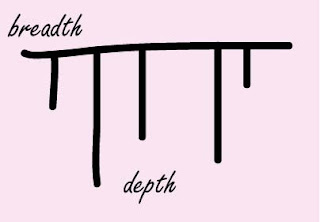Working at a partial hospital program, I spend time thinking about program development - specifically, how to best structure a psychoeducational curriculum. Since we opened 18 months ago, we've generally organized the weekly schedule on what I'll call a "breadth" model. Groups are generally offered once a week. Each group tends to go through a rotation of material, and may build on what is covered in previous weeks, but don't typically tie into other groups happening in the same week.
Since the length of stay in partial is relatively short (3-4 weeks is average, but some patients can be there much longer, or leave right away), and admissions and discharges happen on a rolling basis, the population is always in flux. In practice, that means it's hard to build upon previous weeks. If groups do build on a prior week's group, it's necessary to start with a recap for those who weren't present for the prior group. Each group session has to function, in some respects as a stand-alone, single-session intervention.
The primary rationale for the breadth model is to provide clients with a range of basic information and coping skills. Since not every skill works for every client, nor in every situation, it is hoped that a breadth of options will allow everyone will find something beneficial.
Recently, however, we've been thinking about a different approach, which I'll call a "depth" model. In contrast to the breadth model, the depth model would include sequences of groups that build on each other within the same week, focusing in depth on a particular skill before moving on to a new skill. There would still be some breadth (not every group in the week would address the same topic - that would be overkill!), but not to the same degree.
The rationale for the depth model is that coping skills are skills, requiring practice and repetition to reach the point of truly being useful. Providing only a superficial overview of a skill may not make it accessible to clients, and if a client does try to use a skill to cope, the skill may not be well-developed enough to be helpful. The client may then reach the unfortunate conclusion that the skill "doesn't work" (and maybe none of them work!).
DBT can serve as a useful illustration of breadth vs. depth. DBT includes four skill modules (mindfulness, interpersonal effectiveness, emotion regulation, and distress tolerance). The breadth model would be to have one group each week for each module, and cover the material in each module sequentially over several weeks. Thus, a client would be exposed to all four modules and would learn some, but likely not all, of the material from all of the modules. In contrast, the depth model would devote all four weekly groups to the same module until all of the material has been covered, and then move on to the next module. A client would likely learn most or all of the information in at least one module, but may only learn about one or two modules during the length of their stay.
So, what do you think: is it better to focus on breadth or depth? Is it better for clients at this level of care to be introduced to a wider range of possible skills (and perhaps learn more in individual or outpatient therapy about the particular skills they find helpful), or to become more comfortable and skillful at one or two skills (which may not be the most useful to them, or may leave them without skills for some situations they face)?

ReplyDeleteHello!!
Useful blog. Thank you for sharing with us.
Anyone want to know Farmtrac 50 tractor in India varies depending on the location and dealer. However, it is a reasonably priced tractor model that offers excellent value for money.
Your blog posts are both informative and enjoyable to read. Thank you for sharing your expertise!
ReplyDeletevans in india
Names matter—especially when you're boarding a cruise. The Royal Caribbean Name Change Policy gives you the flexibility to correct errors before your trip begins. From tiny typos to full updates, this policy helps ensure your adventure starts smoothly, with no surprises at the port—just clear sailing ahead.
ReplyDeleteExpert Family Counseling for Emotional Well-being
ReplyDeleteThrough professional family counseling, Dr. Satinder Kaur helps families overcome misunderstandings, manage stress, and build stronger connections. Her therapy sessions are designed to improve trust, resolve conflicts, and promote emotional wellness within the family unit, leading to healthier and happier relationships.
Explore sensual sex position pics to understand exciting moves that deepen intimacy 👉 Sex Position Pics.
ReplyDeletebuy real passport online
ReplyDeleteA Delta Airlines First Class Ticket
ReplyDeleteprovides travelers with a premium flying experience designed for comfort and convenience.